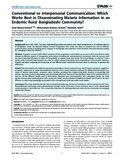Conventional or interpersonal communication: which works best in disseminating malaria information in an endemic rural Bangladeshi community?
Citation
Kabir, M. (2014). Conventional or interpersonal communication: which works best in disseminating malaria information in an endemic rural Bangladeshi community? PloS One, 9(6), e90711. http://doi.org/10.1371/journal.pone.0090711Abstract
Background: Since 2007, BRAC has been implementing malaria prevention and control programme in 13 endemic districts
of Bangladesh under the National Malaria Control Programme. This study was done to examine the role of different
communication media in bringing about changes in knowledge and awareness which facilitate informed decision-making
for managing malaria-like illnesses.
Methods: A baseline survey in 2007 before inception of the programme, and a follow-up survey in 2012 were done to study
changes in different aspects of programme interventions including the communication component. Both the surveys used
the same sampling technique to select 25 households at random from each of the 30 mauza/villages in a district. A pretested,
semi-structured questionnaire was used to collect relevant information from respondents in face-to-face interview.
Analysis was done comparing the study areas at two different times. Statistical tests were done as necessary to examine the
differences.
Results: The intervention succeeded in improving knowledge in some trivial areas (e.g., most frequent symptom suggestive
of malaria, importance of using insecticidal bed nets) but not in critical domains necessary for taking informed action (e.g.,
mode of malaria transmission, awareness about facilities providing free malaria treatment). Inequity in knowledge and
practice was quite common depending upon household affluence, location of households in high or low endemic districts,
and sex. Of the different media used in Information, Education and communication (IEC) campaigns during the study
period, interpersonal communication with community health workers/relatives/neighbours/friends was found to be more
effective in improving knowledge and practice than conventional print and audio-visual media.
Conclusion: This study reiterates the fact that conventional media may not be user-friendly or culture-sensitive for this semiliterate/
illiterate community where dissemination through ‘words of mouth’ is more common, and as such, interpersonal
communication is more effective. This is especially important for initiating informed action by the community in managing
malaria-like illnesses.
Description
Includes bibliographical references (page 7-8).Department
James P Grant School of Public Health, BRAC UniversityType
ArticleCollections
- Article [11]
- Faculty Publications [111]
- Journal Articles (2014) [6]

